There’s a Tiny Utopia in the Middle of Queens
There is confusion over whether it even exists.
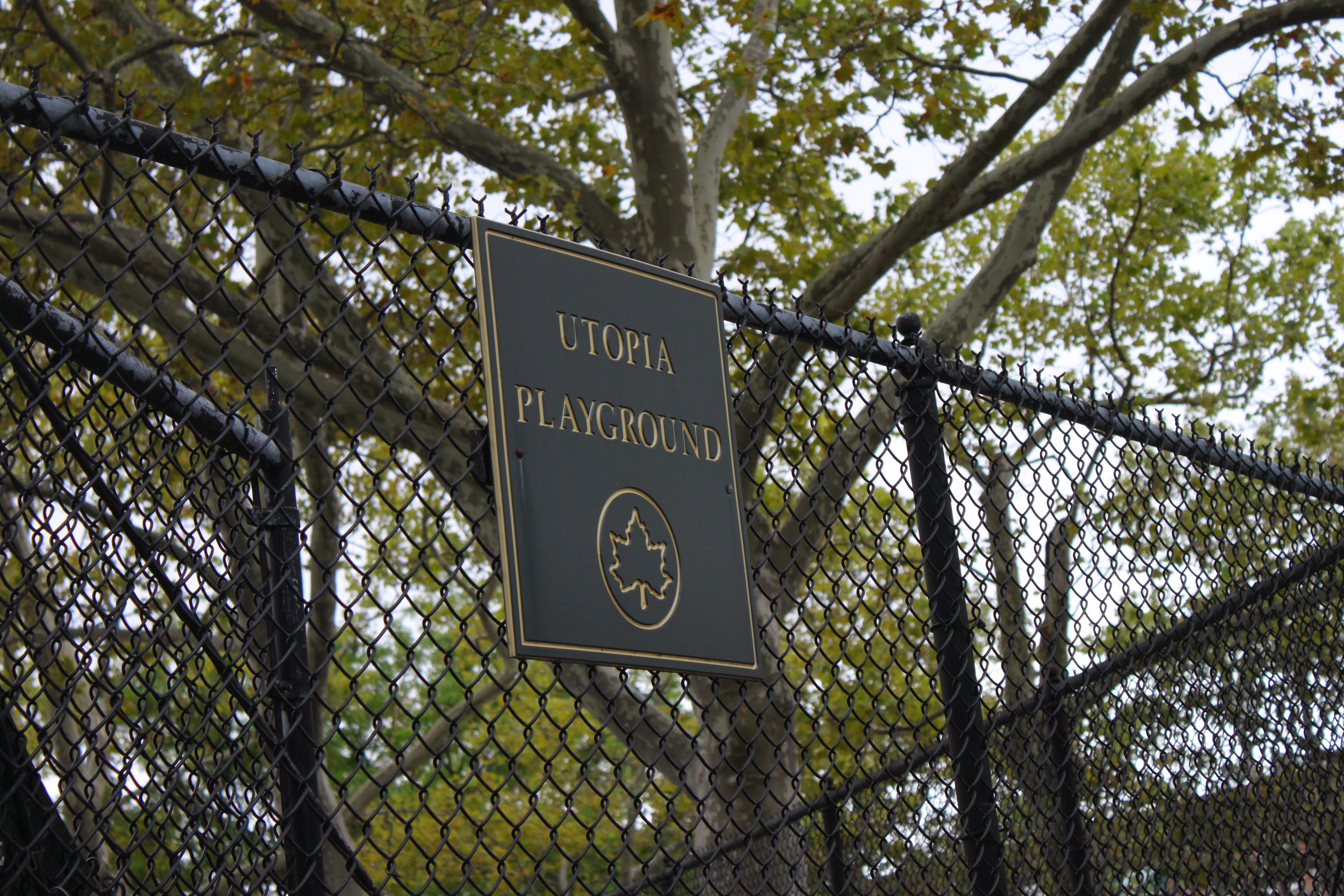 An award-winning playground. (Photo: Jack Goodman)
An award-winning playground. (Photo: Jack Goodman)
New York City has many glorious and terrible attributes. One thing it generally isn’t, though, is utopian. One fifth of the population live below the poverty line, yet it has the highest cost of living in the U.S., with few of the egalitarian living arrangements typical of utopian communities. Yet there is one place in the sprawling metropolis, however, that is literally a Utopia.
Utopia, Queens, is a tiny neighborhood surrounded by Jamaica Estates, Fresh Meadows, and Flushing.
It purportedly got its name from the Utopia Land Company, which in 1903, tried to re-house Jewish families living in Manhattan’s squalid Lower East Side. The plan never came to fruition, but the name lived on in the form of the Utopia Parkway, which influenced the naming of the nearby Utopia playground, and of course the neighborhood itself.
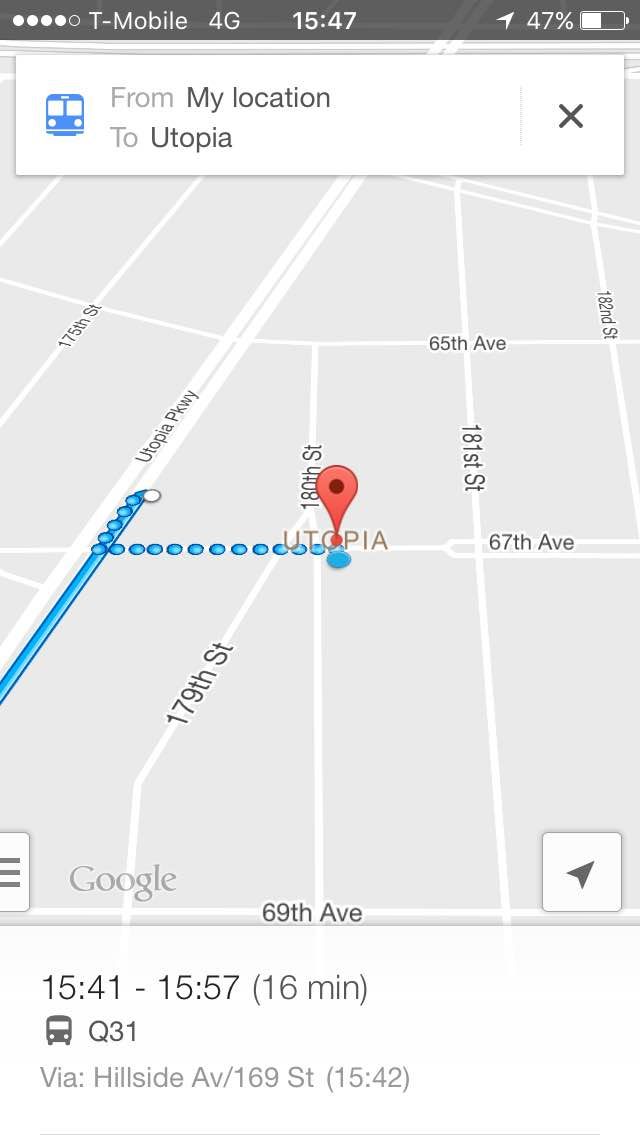 You’re wrong, Google. This is not Utopia. (Photo: (c) 2016 Google)
You’re wrong, Google. This is not Utopia. (Photo: (c) 2016 Google)Exploring Utopia, getting a sense of how “utopian” it is, and speaking to people who live there, it turns out, is not straightforward. Figuring out if the neighborhood bears any relation to paradise depends who you ask and where you look. Some people there will even claim it doesn’t exist.
Google Maps, however, is certain that it does, so I set off to find it. According to Google, the quickest way to get to Utopia from Manhattan’s Upper West Side is via the F train to 169th Street, and then the Q30 or 31 bus. The route seemed simple enough, even if I never thought I’d enter any kind of utopia on a city bus. But as the bus meandered along the final leg of the journey through Flushing, it was exciting to watch the blue map dot move closer to the area designated “UTOPIA”.
I rang the bell to exit the bus at Utopia Playground, a nearly three-acre green space replete with a climbing wall, tennis and basketball courts, and a rainbow fence. The park “lives up to its name,” said Parks and Recreation Commissioner Adrian Benepe, who bestowed it with the honor of “Park of the Month” in December 2009. Impressive.
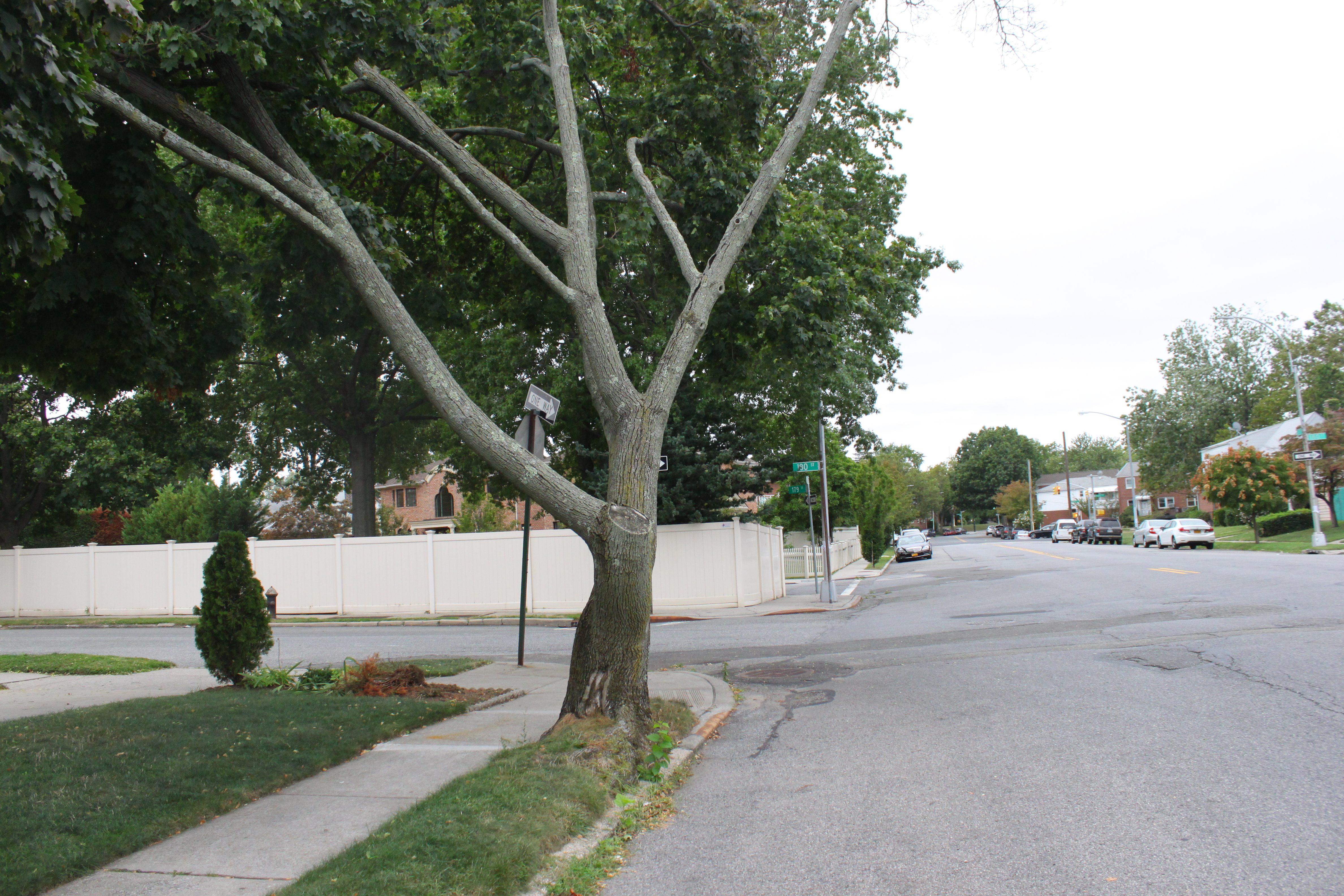 The tree that wrongly marks Utopia. (Photo: Jack Goodman)
The tree that wrongly marks Utopia. (Photo: Jack Goodman)The geographic heart of Utopia, according to Google Maps, was off Utopia Parkway on 67th Avenue and 180th Street. An attractive tree marked the spot: here was Utopia. The area has a distinctly suburban feel. The lawns in front of the two-story detached houses are neatly trimmed, and the flower beds well-tended.
This part of Queens is well-off. Donald J. Trump grew up round the corner in Jamaica Estates. The mean household income is $80,000, house prices in the area keep going up, and more people have college degrees than the city average. The quiet, tree-lined streets give off the impression, in accordance with the statistics, that this is a nice place to live.
A few houses down 180th Street from the exact location of Utopia, a man sat at a desk under his garage roof, filing what looked like newspaper clippings. When asked, he was adamant that this area was not Utopia. He’d never heard of a neighborhood called Utopia, only the street called Utopia Parkway. This was Flushing, he said.
Was Google wrong? Well, maybe just confused.
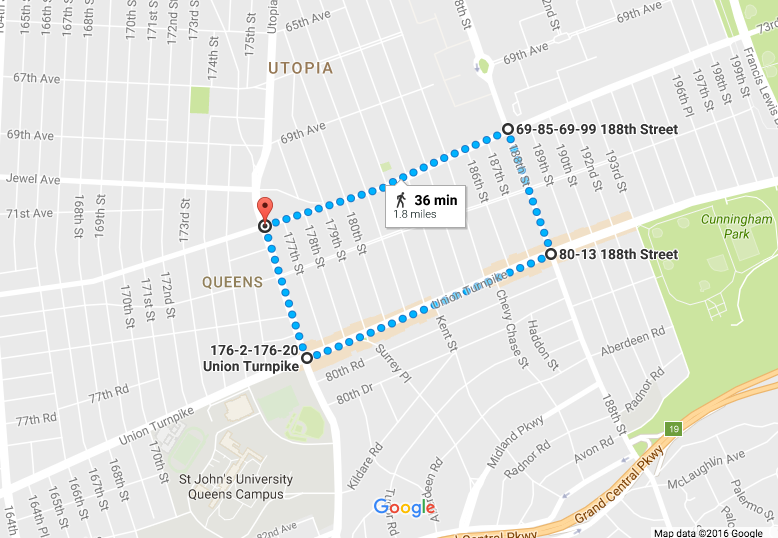 The layout of Utopia, according to Community Board 8. (Photo: (c) 2016 Google)
The layout of Utopia, according to Community Board 8. (Photo: (c) 2016 Google)Turns out, it was foolish to follow Google so blindly. According to the Community Board 8 website, Utopia has a clearly defined geography, south of where it is marked on Google Maps. The demarcated area runs from Utopia Parkway and Union Turnpike to 188th street and up to 73rd Avenue. I headed to a stretch on Union Turnpike, where Jewish delis coexist with Chinese supermarkets and Mexican taquerias.
“Truth of the matter is, there is no utopia in any place unfortunately. We just try to maintain sanity and goodness as much as you can,” says Tami Hirsch, sipping a cappuccino inside Lulu’s Bakery, an Italian-American bakery on Union Turnpike.
Hirsch has lived in Utopia for 50 years, and speaks in glowing terms about a friendly, prosperous and family-oriented place; a hidden jewel in New York City. She knows the area better than most people, as she is the president of the Civic Association of Utopia Estates.
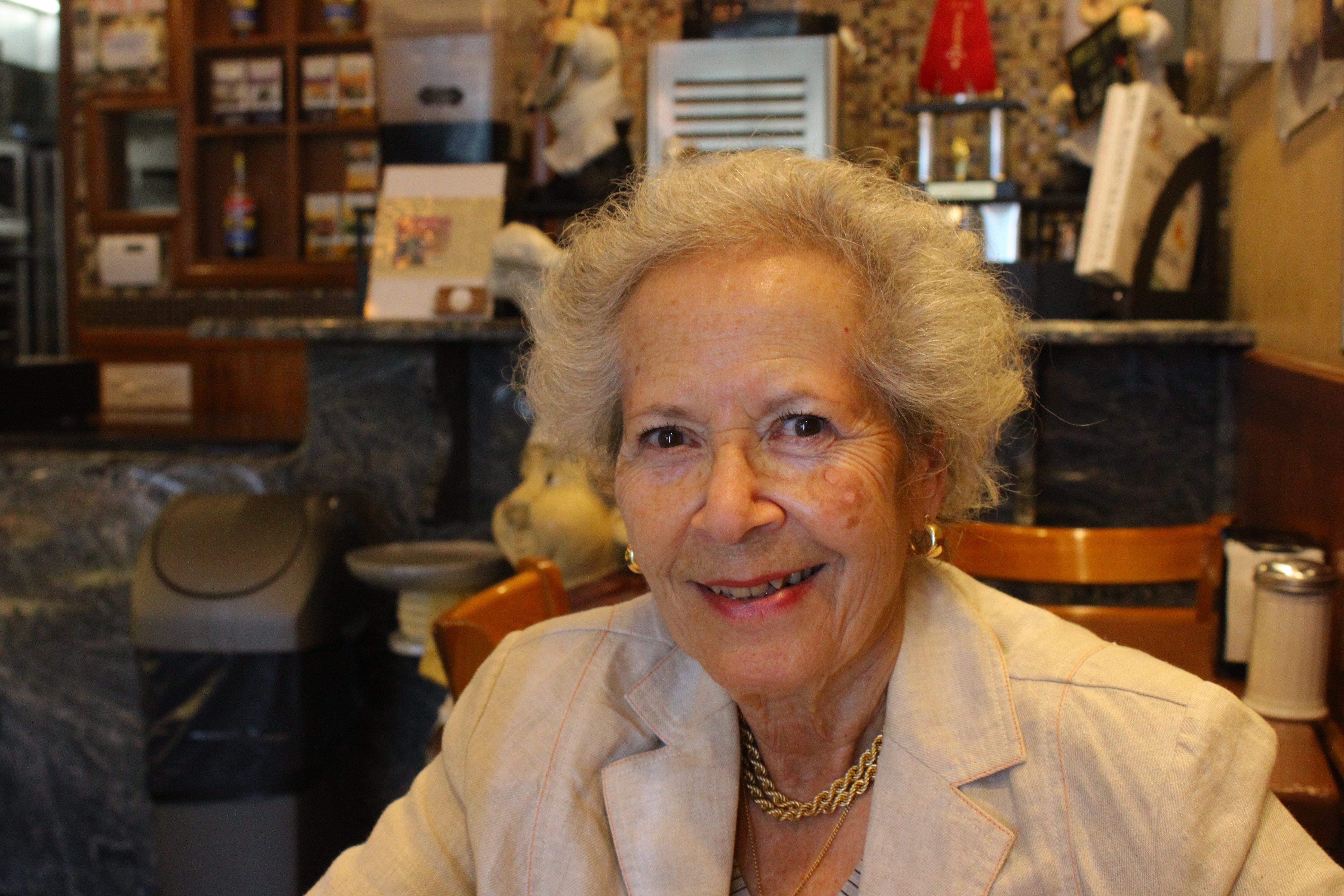 Tami Hirsch, president of the Civic Association of Utopia Estates. (Photo: Jack Goodman)
Tami Hirsch, president of the Civic Association of Utopia Estates. (Photo: Jack Goodman)The Civic Association’s motto “We Are Our Neighbors Keepers”, has a distinct air of utopianism. The group meets four times a year and, says Hirsch, regularly lobbies local politicians on behalf of its residents. Whereas the fortunes of some parts of New York City rise and fall, Utopia has remained consistently pleasant, she says.
It isn’t clear how the Utopia neighborhood came into existence. Unlike the Utopia Parkway, the neighborhood was never officially named. The district manager of the Community Board, Marie Adam-Ovide, says it is more of a sub-section of the Fresh Meadows neighborhood. And Tami Hirsch’s Civic Association, says Adam-Ovide, probably has a lot to do with the fact Utopia even exists at all.
Utopia, Queens, doesn’t appear on business addresses. Charles Tola, the owner of Lulu’s Bakery, says he knows some people call the area Utopia, but he’s only ever used Fresh Meadows for business purposes. Other nearby establishments and homes are listed as Fresh Meadows or Flushing. To confuse matters further, Wikimapia, Google Maps, the New York City census map, Community Board 8 and locality.nyc all provide different boundaries for Utopia.
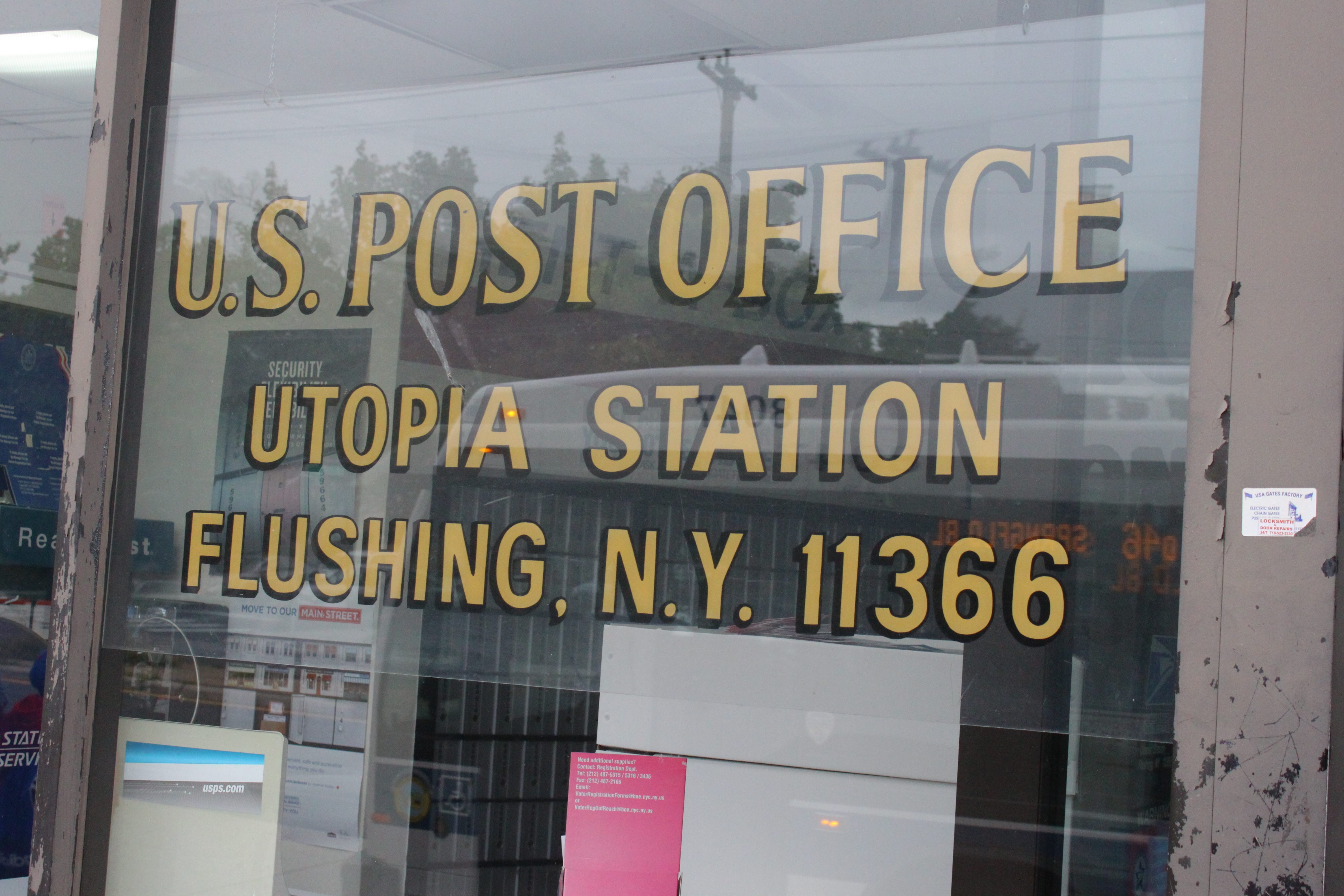 The post office along Union Turnpike. (Photo: Jack Goodman)
The post office along Union Turnpike. (Photo: Jack Goodman)Although it seems like an appealing designation for real estate purposes, too—who wouldn’t prefer to live in a neighborhood named Utopia?—local agents are more pragmatic. “No one has ever referred to it as Utopia,” says David Yudell, a real estate agent for Exit Realty, based in the area. When described over the phone, Yudell says that area is really Fresh Meadows, or part of Flushing.
Yet Utopia, Queens, clearly does exist, at least to the people who are aware they live in it. As the area changes and more people move in and out, it may be up to idealistic civic associations like Tami Hirsch’s to make sure neighborhoods as small as Utopia have a future. We all deserve our own piece of paradise, well-defined or not.




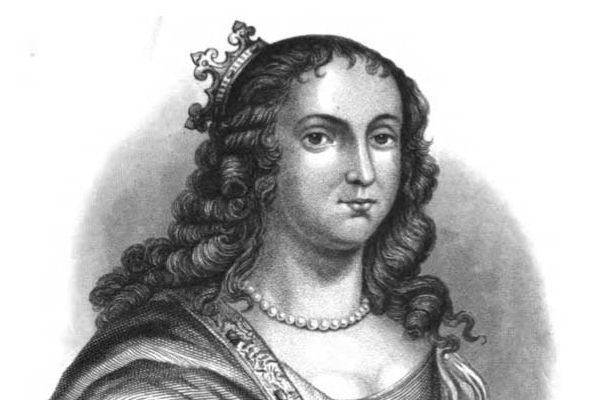





Follow us on Twitter to get the latest on the world's hidden wonders.
Like us on Facebook to get the latest on the world's hidden wonders.
Follow us on Twitter Like us on Facebook